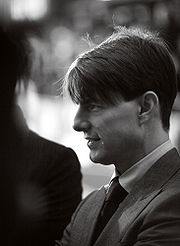
Hubertus Bigend
Encyclopedia
Hubertus Bigend is a fictional character appearing in the later novels of science fiction and literary author William Gibson
. Bigend is the antihero of Gibson's Pattern Recognition
(2003), Spook Country
(2007) and Zero History
(2010). In an interview Gibson says "I’ve always had a sense of Bigend as someone who presents himself as though he knows what’s going on, but who in fact doesn’t. It’s just my sense of the subtext of the character: he’s bullshitting himself, at the same time as he’s bullshitting all of us."
 Bigend is introduced in Pattern Recognition
Bigend is introduced in Pattern Recognition
as the charismatic founder of the fictional "viral advertising
"/coolhunting
agency Blue Ant, from the perspective of protagonist Cayce Pollard
:
Bigend hires Pollard to track down the source of haunting film fragments known as "the footage" that have been appearing anonymously online, though she loathes him and suspects that his motivation is mercenary; the exploitation of the art as a marketable commodity. Bigend and Blue Ant benefit from Pollard's work both by the discovery of the origin of the footage and by a relationship he establishes with a Russian oligarch. In Spook Country, it is revealed that Bigend successfully harnesses the footage to sell shoes.
, but realised when writing about a non-existent magazine named Node—characterized as a European version of Wired
—that it was "way Bigendian". Thus, Bigend appears as the backer of the ethereal magazine. Again seeking out the origin of a new artwork (in this instance locative), Bigend hires protagonist Hollis Henry for the ostensible purpose of writing a magazine article on it. Of Bigend, Henry is told that "he doesn't want you to have heard of him". To sate her curiosity, Henry accesses his fictional Wikipedia
entry:
, Gibson's 2010 follow-up to Spook Country, again as the employer of Hollis Henry. In it, he wears a suit in the color International Klein Blue
which he likes because it is a color that cannot be represented on most computer monitors. The book also reveals that the correct pronunciation of "Bigend" is "bay-jend", though this is seldom used even by Bigend himself.
writer Paul Di Filippo
as amoral and egocentric. Other appellations include "imperious" (SFGate), "enigmatic" (St. Louis Post-Dispatch
), "pontifical Belgian ad mogul" (The Village Voice
), "filthy-rich man-behind-the-curtain" (Seattle Times), "untrustworthy corporate spiv" (The Guardian
), "accentless Machiavellian fixer with unnervingly white teeth" (New Statesman
), and "information-sucking android-like advertising guru and godgame magus" (John Clute
, Sci Fi Weekly).
Academic Alex Wetmore identified a parallel between the relationships of Bigend and Cayce Pollard and that of Case, the protagonist of Gibson's Neuromancer
(1984) and the entity which recruits him, characterizing both Bigend and Case's recruiter as "mysterious and potentially untrustworthy". Wetmore observes that Bigend "espouses a curiously communal and transnational approach to marketing" compared to that of the money-hungry dot-commers whose frontier individualism
the corporate universe has rejected in favour of the Bigendian approach. The character of Bigend thus represents for Wetmore "a shift in the nature of capitalism and, consequently, a change in the way postindustrial technologies deployed by capitalism interact with the self."
s Node was the inspiration for the real-life literary project Node Magazine
.
William Gibson
William Gibson is an American-Canadian science fiction author.William Gibson may also refer to:-Association football:*Will Gibson , Scottish footballer...
. Bigend is the antihero of Gibson's Pattern Recognition
Pattern Recognition (novel)
Pattern Recognition is a novel by science fiction writer William Gibson published in 2003. Set in August and September 2002, the story follows Cayce Pollard, a 32-year-old marketing consultant who has a psychological sensitivity to corporate symbols...
(2003), Spook Country
Spook Country
Spook Country is a 2007 novel by speculative fiction author William Gibson. A political thriller set in contemporary North America, it followed on from the author's previous novel, Pattern Recognition , and was succeeded in 2010 by Zero History, which featured much of its core cast of characters...
(2007) and Zero History
Zero History
Zero History is a novel by William Gibson. It concludes the informal trilogy begun by Pattern Recognition and features Hollis Henry and Milgrim from Spook Country, the middle book, as the protagonists.-Plot:...
(2010). In an interview Gibson says "I’ve always had a sense of Bigend as someone who presents himself as though he knows what’s going on, but who in fact doesn’t. It’s just my sense of the subtext of the character: he’s bullshitting himself, at the same time as he’s bullshitting all of us."
Pattern Recognition

Pattern Recognition (novel)
Pattern Recognition is a novel by science fiction writer William Gibson published in 2003. Set in August and September 2002, the story follows Cayce Pollard, a 32-year-old marketing consultant who has a psychological sensitivity to corporate symbols...
as the charismatic founder of the fictional "viral advertising
Viral marketing
Viral marketing, viral advertising, or marketing buzz are buzzwords referring to marketing techniques that use pre-existing social networks to produce increases in brand awareness or to achieve other marketing objectives through self-replicating viral processes, analogous to the spread of viruses...
"/coolhunting
Coolhunting
Coolhunting is a term coined in the early 1990s referring to a new breed of marketing professionals, called coolhunters. It is their job to make observations and predictions in changes of new or existing cultural trends...
agency Blue Ant, from the perspective of protagonist Cayce Pollard
Cayce Pollard
Cayce Pollard is the fictional protagonist of William Gibson's 2003 novel Pattern Recognition.- Personal history :Aged 32 during the events of the Pattern Recognition, Cayce lives in New York City. Though named by her parents after Edgar Cayce, she pronounces her given name "Case"...
:
Bigend hires Pollard to track down the source of haunting film fragments known as "the footage" that have been appearing anonymously online, though she loathes him and suspects that his motivation is mercenary; the exploitation of the art as a marketable commodity. Bigend and Blue Ant benefit from Pollard's work both by the discovery of the origin of the footage and by a relationship he establishes with a Russian oligarch. In Spook Country, it is revealed that Bigend successfully harnesses the footage to sell shoes.
Spook Country
Gibson did not anticipate Bigend appearing in Spook CountrySpook Country
Spook Country is a 2007 novel by speculative fiction author William Gibson. A political thriller set in contemporary North America, it followed on from the author's previous novel, Pattern Recognition , and was succeeded in 2010 by Zero History, which featured much of its core cast of characters...
, but realised when writing about a non-existent magazine named Node—characterized as a European version of Wired
Wired (magazine)
Wired is a full-color monthly American magazine and on-line periodical, published since January 1993, that reports on how new and developing technology affects culture, the economy, and politics...
—that it was "way Bigendian". Thus, Bigend appears as the backer of the ethereal magazine. Again seeking out the origin of a new artwork (in this instance locative), Bigend hires protagonist Hollis Henry for the ostensible purpose of writing a magazine article on it. Of Bigend, Henry is told that "he doesn't want you to have heard of him". To sate her curiosity, Henry accesses his fictional Wikipedia
Wikipedia
Wikipedia is a free, web-based, collaborative, multilingual encyclopedia project supported by the non-profit Wikimedia Foundation. Its 20 million articles have been written collaboratively by volunteers around the world. Almost all of its articles can be edited by anyone with access to the site,...
entry:
Zero History
Bigend again featured prominently in Zero HistoryZero History
Zero History is a novel by William Gibson. It concludes the informal trilogy begun by Pattern Recognition and features Hollis Henry and Milgrim from Spook Country, the middle book, as the protagonists.-Plot:...
, Gibson's 2010 follow-up to Spook Country, again as the employer of Hollis Henry. In it, he wears a suit in the color International Klein Blue
International Klein Blue
International Klein Blue is a deep blue hue first mixed by the French artist Yves Klein. IKB's visual impact comes from its heavy reliance on Ultramarine, as well as Klein's often thick and textured application of paint to canvas.- History :...
which he likes because it is a color that cannot be represented on most computer monitors. The book also reveals that the correct pronunciation of "Bigend" is "bay-jend", though this is seldom used even by Bigend himself.
Critical impression
Bigend is described by Times Union reviewer Michael Janairo as a "hyper-connected, ever curious, multigazillionaire", and by biopunkBiopunk
Biopunk is a term used to describe:# A hobbyist who experiments with DNA and other aspects of genetics.# A technoprogressive movement advocating open access to genetic information....
writer Paul Di Filippo
Paul Di Filippo
Paul Di Filippo is an American science fiction writer. He has been published in Postscripts...
as amoral and egocentric. Other appellations include "imperious" (SFGate), "enigmatic" (St. Louis Post-Dispatch
St. Louis Post-Dispatch
The St. Louis Post-Dispatch is the major city-wide newspaper in St. Louis, Missouri. Although written to serve Greater St. Louis, the Post-Dispatch is one of the largest newspapers in the Midwestern United States, and is available and read as far west as Kansas City, Missouri, as far south as...
), "pontifical Belgian ad mogul" (The Village Voice
The Village Voice
The Village Voice is a free weekly newspaper and news and features website in New York City that features investigative articles, analysis of current affairs and culture, arts and music coverage, and events listings for New York City...
), "filthy-rich man-behind-the-curtain" (Seattle Times), "untrustworthy corporate spiv" (The Guardian
The Guardian
The Guardian, formerly known as The Manchester Guardian , is a British national daily newspaper in the Berliner format...
), "accentless Machiavellian fixer with unnervingly white teeth" (New Statesman
New Statesman
New Statesman is a British centre-left political and cultural magazine published weekly in London. Founded in 1913, and connected with leading members of the Fabian Society, the magazine reached a circulation peak in the late 1960s....
), and "information-sucking android-like advertising guru and godgame magus" (John Clute
John Clute
John Frederick Clute is a Canadian born author and critic who has lived in Britain since 1969. He has been described as "an integral part of science fiction's history."...
, Sci Fi Weekly).
Academic Alex Wetmore identified a parallel between the relationships of Bigend and Cayce Pollard and that of Case, the protagonist of Gibson's Neuromancer
Neuromancer
Neuromancer is a 1984 novel by William Gibson, a seminal work in the cyberpunk genre and the first winner of the science-fiction "triple crown" — the Nebula Award, the Philip K. Dick Award, and the Hugo Award. It was Gibson's debut novel and the beginning of the Sprawl trilogy...
(1984) and the entity which recruits him, characterizing both Bigend and Case's recruiter as "mysterious and potentially untrustworthy". Wetmore observes that Bigend "espouses a curiously communal and transnational approach to marketing" compared to that of the money-hungry dot-commers whose frontier individualism
Individualism
Individualism is the moral stance, political philosophy, ideology, or social outlook that stresses "the moral worth of the individual". Individualists promote the exercise of one's goals and desires and so value independence and self-reliance while opposing most external interference upon one's own...
the corporate universe has rejected in favour of the Bigendian approach. The character of Bigend thus represents for Wetmore "a shift in the nature of capitalism and, consequently, a change in the way postindustrial technologies deployed by capitalism interact with the self."
Footnotes
Spook CountrySpook Country
Spook Country is a 2007 novel by speculative fiction author William Gibson. A political thriller set in contemporary North America, it followed on from the author's previous novel, Pattern Recognition , and was succeeded in 2010 by Zero History, which featured much of its core cast of characters...
s Node was the inspiration for the real-life literary project Node Magazine
Node Magazine
Node Magazine is a literary project in the guise of a fictional magazine created to annotate the novel Spook Country by William Gibson.The project is essentially a hypertext version of the novel...
.

